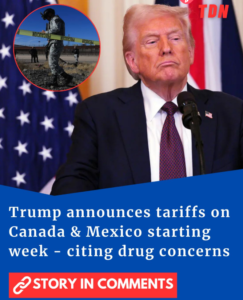Trump Says Tariffs Against Canada and Mexico Will Go Into Effect Next Week: ‘Drugs Are Still Pouring Into Our Country’
In a dramatic escalation of trade tensions, former President Donald Trump announced that tariffs against Canada and Mexico would go into effect next week, a move he claims is necessary to curb the flow of illegal drugs into the United States. The decision, which sent shockwaves through international markets and diplomatic circles, reflects Trump’s ongoing focus on immigration and drug trafficking as central issues of his political platform.
Speaking at a rally, Trump outlined his reasoning for the tariffs, blaming both neighboring countries for failing to adequately control the flow of illegal drugs into the U.S. “Drugs are still pouring into our country,” Trump declared, a line that resonated with many of his supporters who view border security as a critical issue. “We’ve been more than patient with Canada and Mexico, but enough is enough. It’s time to take strong action.”
The tariffs, which are expected to apply to a wide range of goods coming from both countries, represent a significant shift in U.S. trade policy. Trump suggested that the levies would be a means of pressuring Canada and Mexico to take more aggressive action against drug cartels operating within their borders. He argued that the U.S. government has done its part to combat the opioid epidemic and other forms of drug abuse, but that both Canada and Mexico have failed to address the issue in a meaningful way.
The announcement has raised serious concerns among economists and trade experts, who worry about the potential repercussions of such a bold move. Canada and Mexico are two of the United States’ largest trading partners, and any disruption to trade could have significant economic consequences. Goods ranging from agricultural products to automobiles are expected to face higher costs due to the tariffs, potentially leading to inflationary pressure in both the U.S. and its neighboring countries.
Critics of Trump’s approach have argued that the tariffs are a blunt instrument that will harm American consumers and businesses more than they will affect drug trafficking. They point out that the vast majority of illegal drugs come into the U.S. through more covert channels, such as tunnels or through ports of entry, rather than through the regular trade routes. The assertion that tariffs would be an effective means of curbing drug flow has been widely questioned by experts, who note that drug cartels have become highly adept at circumventing border security measures.
Despite the concerns, Trump remained steadfast in his decision, framing it as a necessary step in protecting American citizens. He repeated his familiar mantra about putting America first, stating that “we cannot allow our country to be overrun by illegal drugs and criminals.” His rhetoric played on the fears of many Americans who have witnessed the devastation caused by the opioid crisis and other forms of substance abuse.
The move is also being seen as part of Trump’s broader strategy to position himself as the tough-on-crime, law-and-order candidate as he prepares for a potential run in the 2024 presidential election. By invoking the threat of drug-related violence and reinforcing his tough stance on immigration and border security, Trump is seeking to rally his base while portraying his opponents as weak on these critical issues.
On the international stage, the tariffs have sparked immediate backlash. Canadian officials have expressed concerns over the economic impact, while Mexican leaders have vowed to challenge the tariffs through diplomatic and legal channels. Both countries argue that the U.S. is unfairly scapegoating them for broader issues related to drug trafficking and organized crime.
As the tariffs loom, the global trade community is bracing for potential disruptions. With the clock ticking down to their implementation, questions remain about how Canada, Mexico, and other stakeholders will respond. Will the tariffs force a change in policy, or will they deepen the rift between the U.S. and its neighbors? One thing is clear: this is far from the last chapter in the ongoing battle over trade, drugs, and border security.
